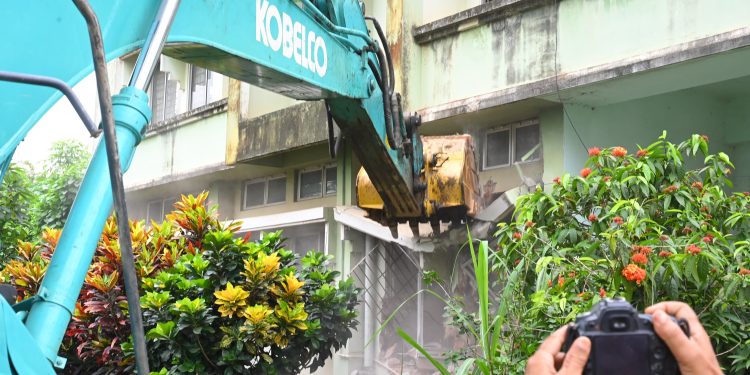The Assam Government demolished the Institute of Cooperative Management (ICM) on Tuesday, advancing its ambitious plan to construct a large-scale water reservoir at Silsako Beel. This project seeks to tackle Guwahati’s persistent flooding by restoring the wetland’s natural water retention capacity, a vital step toward a flood-resilient city.
Minister for Housing and Urban Affairs, Jayanta Mallabaruah, actively supervised the demolition and reaffirmed the government’s dedication to sustainable urban planning. “We are clearing the Institute of Cooperative Management from Silsako Beel to achieve our goal of a flood-free Guwahati,” Baruah declared to the media.
The Silsako reservoir project anchors the state’s flood mitigation strategy. Experts identify Silsako Beel, alongside Deepor Beel, as a critical natural catchment area that captures substantial stormwater volumes. Its strategic position collects runoff from Guwahati and parts of Meghalaya, playing a pivotal role in flood control. The reservoir will store water and release it into the Brahmaputra via Bondajan, effectively managing excess rainwater during heavy rainfall and high river levels.
The government actively conducts the eviction process in phases, systematically relocating institutional structures while adhering to legal protocols. After successfully relocating the Omeo Kumar Das Institute earlier this week, authorities now focus on ICM. They plan to evict the Institute of Hotel Management (IHM), the Tennis Court, and Ginger Hotel in the coming weeks, aiming to reclaim nearly 800 bighas of land for the reservoir.
Minister Baruah emphasized the government’s commitment to fairness and compassion. Authorities have provided the Cooperative Institute with a temporary facility in Rehabari, a permanent site in Sonapur, and a financial compensation package. “We execute these evictions one by one, ensuring due process and proper rehabilitation,” he stated.
The government expects to complete the relocation of remaining structures within this monsoon season and will commence excavation work during the dry months. Once operational, the reservoir will significantly enhance Guwahati’s ability to manage urban flooding, especially when the Brahmaputra’s water levels surpass the city’s. “The Silsako reservoir will store excess water and allow us to pump it out as needed,” Baruah explained.
This major urban infrastructure project strengthens Guwahati’s resilience against climate-related challenges. The government pledges to implement all measures in an environmentally conscious and socially responsible manner.
GMDA Chairman Shri Narayan Deka, Commissioner & Secretary Smt. Kavita Padmanabhan, and other senior officials attended the demolition, highlighting the project’s importance.





